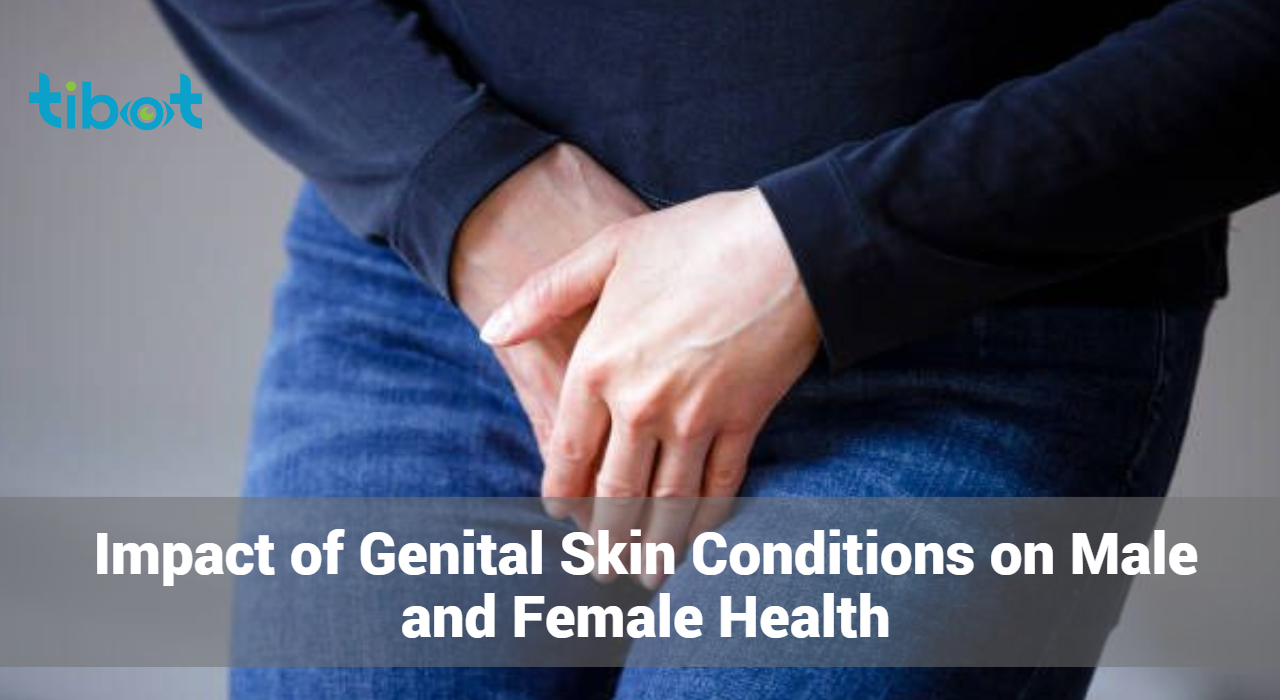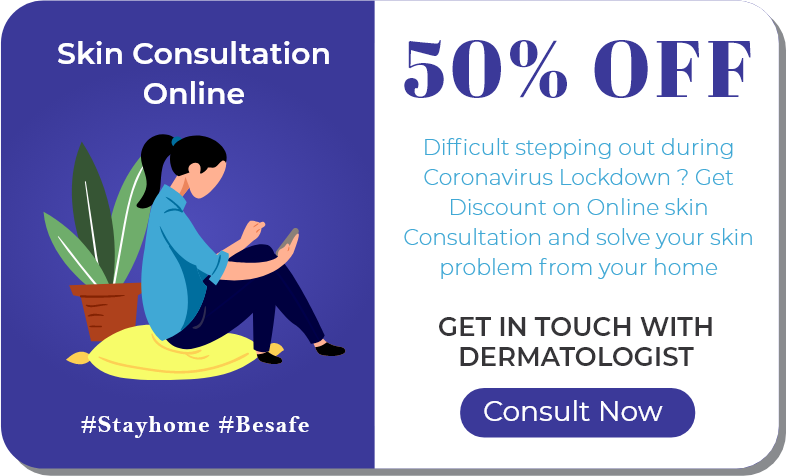Impact of Genital Skin Conditions on Male and Female Health

Genital skin conditions can profoundly affect both physical and psychological health in males and females. These conditions, which range from infections to dermatological disorders, often cause significant discomfort and can lead to complications if not properly managed. Understanding the common genital skin conditions, their symptoms, causes, and treatments is essential for maintaining overall genital health and well-being.
What Is Genital Skin Conditions?
Genital skin conditions encompass a range of dermatological issues affecting the skin in the genital area. These skin conditions can affect both males and females and can be caused by various factors, including infections, allergies, autoimmune diseases, and other underlying health issues.
Common Genital Skin Conditions In Males
Balanitis:
- Symptoms: Inflammation of the glans (head) of the penis, redness, swelling, pain, and discharge.
- Causes: Poor hygiene, infections (bacterial, fungal, viral), allergies, and irritants.
- Treatment: Improved hygiene, topical antifungals or antibiotics, and avoiding irritants.
Phimosis and Paraphimosis:
- Symptoms: Inability to retract the foreskin (phimosis) or the foreskin being stuck behind the glans (paraphimosis), leading to pain and swelling.
- Causes: Infections, scarring, and congenital conditions.
- Treatment: Topical steroids, gentle stretching exercises, or surgical intervention (circumcision).
Genital Warts:
- Symptoms: Small, flesh-colored or gray growths on the genital area.
- Causes: Human papillomavirus (HPV) infection.
- Treatment: Topical treatments, cryotherapy, laser therapy, or surgical removal.
Herpes Simplex Virus (HSV):
- Symptoms: Painful blisters or sores on the genital area, itching, and flu-like symptoms.
- Causes: Infection with HSV-1 or HSV-2.
- Treatment: Antiviral medications to reduce symptoms and prevent outbreaks.
Lichen Sclerosus:
- Symptoms: White, shiny patches on the genital skin, itching, and pain.
- Causes: Unknown, but may be related to autoimmune factors.
- Treatment: Topical steroids, immunosuppressants, and regular monitoring.
Vulvovaginal Candidiasis (Yeast Infection):
- Symptoms: Itching, burning, white vaginal discharge, and redness.
- Causes: Overgrowth of Candida fungus.
- Treatment: Antifungal medications (topical or oral).
Bacterial Vaginosis (BV):
- Symptoms: Thin, gray discharge with a fishy odor, itching, and burning during urination.
- Causes: Imbalance of normal vaginal bacteria.
- Treatment: Antibiotics (oral or topical).
Genital Herpes:
- Symptoms: Painful blisters or sores on the genital area, itching, and flu-like symptoms.
- Causes: Infection with HSV-1 or HSV-2.
- Treatment: Antiviral medications to reduce symptoms and prevent outbreaks.
Lichen Sclerosus:
- Symptoms: White, shiny patches on the genital skin, itching, and pain.
- Causes: Unknown, but may be related to autoimmune factors.
- Treatment: Topical steroids, immunosuppressants, and regular monitoring.
Lichen Planus:
- Symptoms: Flat, purple, itchy bumps on the genital area.
- Causes: Unknown, possibly autoimmune.
- Treatment: Topical steroids, antihistamines, and immunosuppressants.
What Are The Causes and Risk Factors?
Genital skin conditions can arise from various causes, including infections, autoimmune disorders, allergic reactions, poor hygiene, and trauma. Risk factors include unprotected sexual activity, multiple sexual partners, personal or family history of skin conditions, and compromised immune systems.
- Infections: Bacterial, fungal, and viral infections can cause or exacerbate genital skin conditions.
- Autoimmune Disorders: Conditions like lichen sclerosus and psoriasis are linked to autoimmune responses.
- Allergies: Allergic reactions to soaps, lubricants, or latex can lead to genital skin issues.
- Poor Hygiene: Inadequate hygiene practices can cause or worsen conditions like balanitis and vulvitis.
- Trauma: Physical trauma to the genital area, including friction from clothing or sexual activity, can contribute to skin problems.
How It Affects Your Physical Health?
- Pain and Discomfort: Genital skin conditions can cause significant pain and discomfort, affecting daily activities, sexual health, and overall quality of life. Conditions like herpes and lichen sclerosus can lead to chronic pain, making it difficult to engage in sexual activity and impacting intimate relationships.
- Infections and Complications: Untreated genital skin conditions can lead to secondary infections and complications. For example, bacterial infections can worsen if not treated promptly, and conditions like phimosis can lead to urinary retention and increased risk of urinary tract infections.
- Sexual Dysfunction: Chronic genital skin conditions can cause sexual dysfunction due to pain, discomfort, or psychological stress. Conditions like herpes can lead to anxiety about transmission to partners, further complicating sexual relationships.
- Impact on Reproductive Health: Certain genital skin conditions can affect reproductive health. For example, severe infections can lead to scarring and adhesions, potentially impacting fertility. In women, untreated BV can increase the risk of pelvic inflammatory disease (PID), which can affect fertility.
Psychological and Emotional Impact Of Genital Skin Conditions
- Anxiety and Depression: The visible and often painful nature of genital skin conditions can lead to significant psychological distress. Individuals may experience anxiety, depression, and low self-esteem, particularly if the condition affects their sexual relationships.
- Social Stigma: Genital skin conditions can carry a social stigma, leading to embarrassment and reluctance to seek medical help. This can result in delayed diagnosis and treatment, worsening the condition and its impact on health.
- Impact on Intimacy: The psychological burden of genital skin conditions can affect intimate relationships. Individuals may feel self-conscious about their condition, leading to avoidance of sexual activity and strain on relationships.
Analyze Skin Diseases
Use our AI chatbot to determine your skin condition
Diagnosis
Diagnosis of genital skin conditions typically involves a physical examination, medical history, and, if necessary, laboratory tests such as swabs, cultures, or blood tests. Consult a dermatologist and gynecologists/urologists often work together to diagnose and manage these conditions.
Treatment varies depending on the condition and its severity. Common treatments include:
- Topical Treatments: Creams and ointments, including corticosteroids, antifungals, and antivirals, are commonly used to treat various genital skin conditions. They help reduce inflammation, control infections, and alleviate symptoms.
- Oral Medications: For more severe infections or conditions that do not respond to topical treatments, oral antibiotics, antifungals, or antivirals may be prescribed.
- Surgical Interventions: In cases of phimosis, circumcision or other surgical procedures may be necessary. Bartholin’s cysts may require drainage or surgical removal if infected.
- Lifestyle Changes: Maintaining good hygiene, avoiding irritants, and practicing safe sex are essential in preventing and managing genital skin conditions.
- Psychological Support: Counseling and support groups can help individuals cope with the psychological and social impacts of their condition.
Why Is It Important to Prevent Genital Skin Conditions?
Preventing genital skin conditions is crucial for maintaining overall health and well-being. These conditions can cause significant discomfort, pain, and psychological distress. Preventing them helps avoid complications, improve quality of life, and maintain sexual and reproductive health.
Preventing genital skin conditions involves several strategies:
- Good Hygiene: Regular cleaning of the genital area with mild soap and water can prevent infections and irritations.
- Safe Sex Practices: Using condoms, limiting the number of sexual partners, and getting regular STI screenings can reduce the risk of sexually transmitted infections.
- Avoiding Irritants: Avoiding harsh soaps, detergents, and personal care products can prevent irritant dermatitis.
- Regular Medical Check-ups: Regular visits to a healthcare provider can help detect and manage conditions early.
Conclusion
Genital skin conditions are complex and multifaceted, affecting both males and females across all age groups. These conditions can significantly impact physical health, emotional well-being, and social interactions. Comprehensive management involves a combination of medical treatment, lifestyle modifications, psychological support, and education. By increasing awareness and understanding, healthcare providers can improve diagnosis, treatment, and quality of life for individuals affected by genital skin conditions.
Final Thoughts
It is important for individuals to seek medical advice promptly if they experience symptoms of a genital skin condition. Early diagnosis and treatment can prevent complications and improve outcomes. Furthermore, raising awareness about genital skin conditions can help reduce stigma and encourage people to seek the care they need.
Understanding the nuances of these conditions and their impact on health can lead to better management strategies and improved quality of life for those affected. Healthcare providers play a crucial role in educating patients, providing compassionate care, and supporting individuals through their treatment journey.
By addressing both the physical and psychological aspects of genital skin conditions, we can work towards holistic care and better health outcomes for all individuals.





